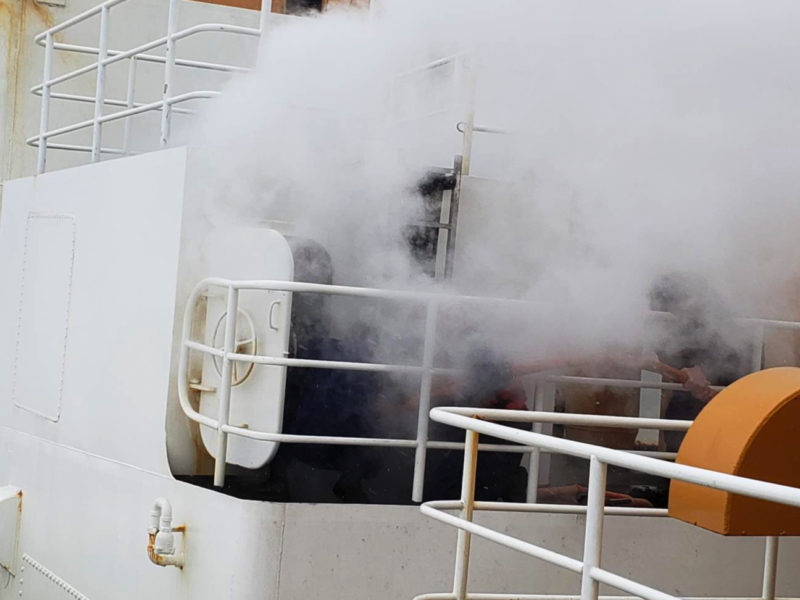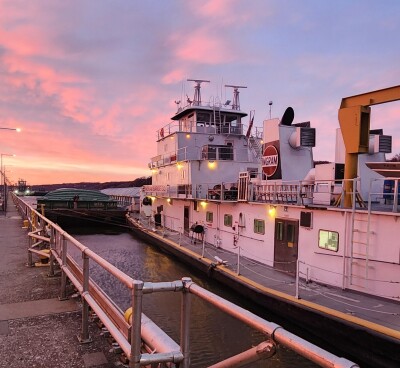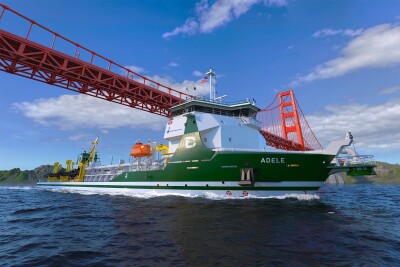The crew of the Coast Guard icebreaker Polar Star fought fire that broke out in the ship’s incinerator compartment Feb. 10, the latest trouble to face the crew on their long deployments to Antarctica.
After expending four fire extinguishers trying to stop the fire, the crew needed two hours to put out the blaze. Damage from the fire was contained inside the incinerator, but several electrical systems and insulation nearby were damaged by firefighting water as the crew cooled down the incinerator exhaust pipe.
The incident happened around 9 p.m. Pacific standard time about 650 miles north of McMurdo Sound in Antarctica, site of the U.S. science mission base on the continent and the Polar Star’s destination on its annual support and resupply mission.

The fire erupted in the ship's incinerator compartment. Coast Guard image from ship's monitoring cameras.
No injuries were reported, and the cause of the fire is under investigation, according to the Coast Guard.
“It’s always a serious matter whenever a shipboard fire breaks out at sea, and it’s even more concerning when that ship is in one of the most remote places on Earth,” said Vice Adm. Linda Fagan, commander of the U.S. Coast Guard’s Pacific Area. “The crew of the Polar Star did an outstanding job – their expert response and determination ensured the safety of everyone aboard.”
The 339’x83’6”x31’ Polar Star was commissioned in 1976 and is the sole U.S. heavy icebreaker. Its crew has dealt with mounting mechanical and electrical issues with the aging equipment during the annual Operation Deep Freeze, the joint military service mission that supports the National Science Foundation and its United States Antarctic Program.
The Polar Star crew departed their homeport of Seattle Nov. 27 for their sixth deployment in as many years and travelled more than 11,200 miles to Antarctica. While underway one of the ship’s electrical systems began to smoke, damaging in an electrical switchboard, while one of two evaporators providing potable water failed. The crew made the electrical fixes at sea and got parts for the evaporator during a port call at Wellington, New Zealand.
Approaching Antarctica, the Polar Star broke nearly 17 miles of ice, 6’ to 10’ thick, to open a channel for resupply shipments through McMurdo Sound. That operation was interrupted by a leak in a propeller shaft, requiring scuba divers to go in the water and repair a shaft seal. Ship-wide power outages happened during icebreaking, forcing the crew to spend nine hours shutting down the ship’s power plant and rebooting the electrical system.
On Jan. 30, the Polar Star escorted the container ship Ocean Giant through the channel, enabling a 10-day offload of nearly 500 containers with 10 million pounds of goods that will resupply McMurdo Station, Amundsen-Scott South Pole Station and other U.S. field camps. After leaving Antarctica, the Polar Star crew arrived in New Zealand for a port call, and they are presently en route to their homeport of Seattle.

The heavy icebreaker Polar Star in McMurdo Sound, Antarctica near the National Science Foundation’s McMurdo Station in 2016. U.S. Coast Guard photo/ PO2 Grant DeVuyst.
With only one other icebreaker, the 420’ medium icebreaker Healy, the U.S. has almost no self-rescue ability if either ship were to become stranded in the polar regions. In its recent budget deal, Congress finally provided $655 million to begin construction of the first in a new class of six heavy icebreakers – or “polar security cutters,” as Coast Guard advocates have dubbed them.
But it may be six years from the time a contract is signed until that first new ship is commissioned, Coast Guard Commandant Adm. Karl Schultz has warned lawmakers repeatedly.
“While we focus our efforts on creating a peaceful and collaborative environment in the Arctic, we’re also responding to the impacts of increased competition in this strategically important region,” Schultz said in a statement Thursday. “Our continued presence will enable us to reinforce positive opportunities and mitigate negative consequences today and tomorrow.”





